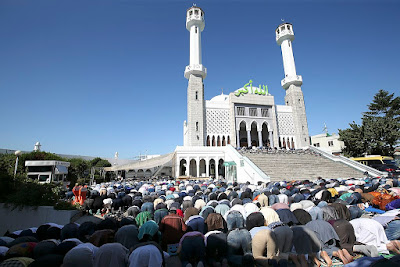Eid is a festival that comes on the day after the days of Ramazan have been devoted to fasting. It is celebrated all over the Muslim world. This is the day when exchange of sweet dishes is made between the near and dear ones. At the very outset of the story it is made clear that Eid is more than the vermicelli thing. It must not be taken merely as a festival of joy and celebration. There is something more to do for the Muslims on this particular day.
Firstly the child observes the devotees in the mosque who raises offertory for the prayer keeper. The situation of the prayer-keepers in our society is very pathetic. Though they are the Imams of our prayers yet they live in a very pitiable condition. We often ignore them and they are provided just a paltry sum of rupees to meet the very needs of their lives.
When the child comes out of the mosque, he finds the beggars twitching and tugging the clothes of the people. They ask for something. When the child observes this situation, he is actually made aware of the miseries and sorrows of the poor people. The poverty rate in our country is rapidly increasing. It is no doubt an alarming situation. The beggars are shabby and dirty. Their clothes are full of muddy smudges and they have nothing to fill their bellies while the other people are enjoying the costly clothes and shoes and various dishes in their houses.
There is an innocent desire to “anchor their corduroy cheeks”. He wishes the joys and celebrations must be for all and sundry and no person should be unsupplied with these pleasures. The well-off and prosperous Muslims should not ignore these down-trodden people. They must give them their share of happiness.
On the dining table, the child goes into the depth. There are a number of questions regarding the miseries and sorrows, hovering around his plate. He is being overcome by the feelings of sympathy for the poor people. When the child holds the shining spoon in front of his face, he is actually finding a big contrast with those begrimed faces distorted by poverty. This indicates the huge gap between the rich and the poor in our country. How can this injustice be eliminated? We all are to perform something. The festivals like Eid are actually the reminders for this national and moral responsibility.
IMAGE ATTRIBUTION:
Korea.net / Korean Culture and Information Service (Photographer name) / CC BY-SA
IMAGE ATTRIBUTION:
Korea.net / Korean Culture and Information Service (Photographer name) / CC BY-SA









